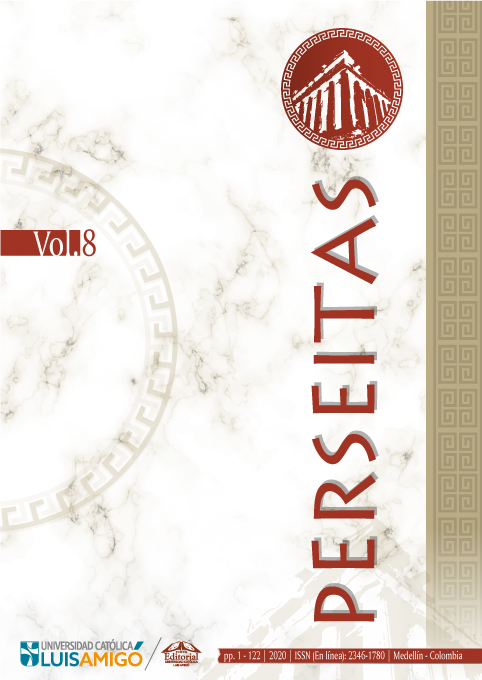The mind-body ontological problem: unsolvable or misunderstood?
DOI:
https://doi.org/10.21501/23461780.3672Keywords:
Brain, Body, Philosophy, Mind, Neuroscience, OntologyAbstract
The objective of this article is to state that the mind-body problem, understood in terms of the determination of an ontology, be it monistic or dualistic, has been poorly addressed; hence, it leads to intricate paths and erroneous, as well as extravagant, conclusions. Understanding the relationship of the mind with the brain, in ontological terms, is among other factors, due to the Cartesian inheritance and its clear dualism. It is argued that the philosophical mind-body problem is not different from a scientific mind-body (brain) problem, in which one must look for support in the empirical evidence. Finally, it is argued that a successful philosophical analysis regarding the relationship between the mental and the cerebral must be considered as a conceptual problem associated with linguistic meaning and with epistemological consequences, but not ontological. Likewise, it is concluded that many of the concepts related to the mental must be considered in relation to institutional reality in order to avoid an eliminatory attempt at naturalization.
Downloads
References
Block, N. (Comp.). (1980). Readings in Philosophy of Psychology. Cambridge, USA: Harvard University Press.
Buckner, R. L., & Carroll, D. C. (2007). Self-projection and the brain. Trends in Cognitive Sciences, 11(2), 49–57. doi: 10.1016/j.tics.2006.11.004
Carnap, R. (1981). Psicología en lenguaje fisicalista. En A. J. Ayer (Comp.) El positivismo lógico (pp. 171-204). México: Fondo de Cultura Económica.
Churchland, P. (1995). El materialismo eliminativo y las actitudes proposicionales. En E. Rabossi (Comp.), Filosofía de la mente y ciencia cognitiva (pp.43-68). Barcelona: Paidós.
Churchland, P. (2007). Neurophilosophy at work. Cambridge, England: Cambridge University Press.
Chalmers, D. (1996). La mente consciente: en busca de una teoría fundamental. Barcelona, España: Gedisa.
Coward, L. A. (2013). Towards a theoretical neuroscience: from cell chemistry to cognition. Australia: Springer.
Davidson, D. (1963). Actions, Reasons and Causes. Journal of Philosophy, 60, 685-700.
Davidson, D. (1980). Mental Events. In D. Davidson (Ed.), Essays on Actions and Events (pp. 207-227). New York, USA: Oxford University Press.
Davidson, D. (1991). Three Varieties of Knowledge. In A. G. Phillips (Ed.), A.J. Ayer: Memorial Essays: Royal Institute of Philosophy Supplement, 30, (pp.153-166) Cambridge:. Cambridge University Press.
Descartes, R. (2005). Las Meditaciones Metafísicas (G. Graíño Ferrer, Trad.). Madrid: Alianza Editorial.
De Brigard, F. (2017). El problema de la conciencia para la filosofía de la mente y de la psiquiatría. Ideas y Valores, 66(3), 15-45. doi: 10.15446/ideasyvalores. v66n3Supl.65652
Dehaene, S., & Naccache, L. (2001). Towards a Cognitive Neuroscience of Consciousness: Basic Evidence and a Workspace Framework. Cognition, 79(1), 1-37. doi: 10.1016/S0010-0277(00)00123-2
Dennett, D. (1978). Skinner skinned. In D. Dennet (Ed.), Brainstorms: Philosophical Essays on Mind and Psychology (pp. 53-70). Cambridge, Massachusetts: The MIT Press.
Dennett, D. (1995). La conciencia explicada. Una teoría interdisciplinar. Buenos Aires, Argentina: Paidós.
Dennett, D. (1997). Kinds of Minds: Toward and Understanding of Consciousness. New York, USA: Basic Books.
Dennett, D. (1998). La actitud intencional. Barcelona, España: Gedisa.
Dennett, D. (2005). Sweet Dreams: Philosophical Obstacles to a Science of Consciousness. Cambridge, Massachusetts: The MIT Press.
Dennett, D. (2014). El problema ontológico de la mente. En D. Dennett (Ed.), Contenido y conciencia (pp. 19-40). Barcelona: Gedisa.
Dennett, D. (2017). De las bacterias a Bach. La evolución de la mente. Barcelona: Pasado y Presente.
Fodor, J. (2000). The Mind Doesn’t Work That Way: The Scope and Limits of Computational Psychology. Massachusetts, USA: The MIT Press.
Fuster, J. M. (2000). The module: Crisis of a paradigm. Neuron, 26, 51-53. doi: 10.1016/S0896-6273(00)81137-X
Gillet, G. R., & McMillan J. (2001). Consciousness and Intentionality. Filadelfia: John Benjamins B.V.
Giménez, J. M., & Murillo, J. I. (2007). Mente y cerebro en la neurociencia contemporánea.
Una aproximación a su estudio interdisciplinar. Scripta
Theologica, 30(2), 607-635. Recuperado de https://bit.ly/3kJIX3M
Gómez, A. S., Ospina, J. F., & Micolta, A. F. (2019). Hacia una explicación naturalizada del problema filosófico de las otras mentes. Revista Guillermo de Ockham, 17(2), 61-70. doi: 10.21500/22563202.4269
Gómez, A. S. (2018). De la cosmología peirceana a la evolución social. Reflexiones sobre el agapismo y los hábitos sociales en sentido evolutivo. Cuadernos de Filosofía Latinoamericana, 39, 37-58. doi: 10.15332/10.15332/s0120-8462.2018.0118.02
Gonzales-Álvarez, J. (2014). La mente y el cerebro: historia y principios de la neurociencia cognitiva. En D. Redolar (Comp.), Neurociencia cognitiva (pp. 3-26). Madrid, España: Médica Panamericana.
Hacker, P. M. S. (2006). Passing by the Naturalistic Turn: On Quine´s Cul-de-Sac. Philosophy, 81(316), 231-253.
Hempel, C. (1980). The Logical Analysis of Psychology. In N. Block (Comp.), Readings in Philosophy of Psychology (pp.11-23). Cambridge, USA: Harvard University Press.
Howard, R. (2017). Dualism. The Stanford Encyclopedia of Philosophy. In E.N. Zalta (Ed.). Recuperado de https://plato.stanford.edu/archives/fall2017/entries/dualism/
Husserl, E. (1986). Ideas relativas a una fenomenología pura y una filosofía fenomenológica. Ciudad de México, México: Fondo de Cultura Económica.
Jackson, F. (2003). Qualia epifenoménicos. En M. Ezcurdia y O. Hansberg (Comps.), La naturaleza de la experiencia (pp. 95-118). Ciudad de México, México: Universidad Autónoma de México.
Johnson, P. N. (1983). Mental Models. Cambridge, Mass: Harvard University Press.
Kim, J. (2002). El problema mente-cuerpo tras cincuenta años. Azafea: Revista de Filosofía, 4, 45-63. https://bit.ly/2Q0bxjn
Koch, C., Massimini, M., Boly, M., & Tononi, G. (2016). Neural correlates of consciousness: progress and problems. Nature Reviews Neuroscience, 17(5), 307–321. doi:10.1038/nrn.2016.22
Kügler, P. (2013). The ever-shifting problem of consciousness. Theory & Psychology, 23(1), 46-59. doi: 10.1177/0959354312457112
Lamme, V. A. F. (2006). Towards a True Neural Stance on Consciousness. Trends in Cognitive Sciences, 10(11), 494-501. doi: 10.1016/j.tics.2006.09.001
Lewis, D. (1972). Psychophysical and Theoretical Identifications. Australasian Journal of Philosophy, 50, 249-258.
Lewis, D. (1980). Mad Pain and Martian Pain. In N. Block (Ed.), Readings in Philosophy of Psychology, (V. I) (pp. 216-232). Cambridge, MA: Harvard University Press.
Lewis, D. (1988). What Experience Teaches. In Proceedings of the Russellian Society (vol. 13), (pp. 29-35). Sydney: University of Sydney.
Lewis, D. (1993). Reduction of Mind. In S. Guttenplan (Ed.). A companion to the philosophy of mind, (pp. 412-431). Oxford: Blackwell.
Mallott, H. A. (2013). Computational neuroscience: A first course. Germany: Springer.
McGinn, C. (2003). ¿Podemos resolver el problema mente cuerpo? En M. Ezcurdia y O. Hansberg (Comps.), La naturaleza de la experiencia (pp.65-94). Ciudad de México, México: Universidad Autónoma de México.
Merleau-Ponty, M. (1997). Fenomenología de la percepción. Ciudad de México, México: Fondo de Cultura Económica.
Nannini, S. (2018). The mind-body problem in the philosophy of mind and cognitive neuroscience: a physicalist naturalist solution. Neurological Sciences, 39(9), 1509–1517. doi: 10.1007/s10072-018-3455-6
Neander, K. (2017). A Mark of the Mental: in Defense of Informational Teleosemantics. Cambridge, Mass: The MIT Press.
Livingston, P. M. (2017). Presentation and the Ontology of Consciousness. Grazer philosophische studien, 94, 301-331. doi: 10.1163/18756735-09403002
Place, U. T. (2002). Is Consciousness a Brain Process? In D. Chalmers (Comp.), Philosophy of mind: classical and contemporary readings (pp. 55-60). Nueva York: Oxford University Press.
Putnam, H. (1975). Mind, Language and Reality. Philosophical Papers. Cambridge, England: Cambridge University Press. doi: 10.1017/CBO9780511625251
Quine, W. V.O. (1975). Mind and verbal dispositions. In S. Guttenplan (Ed.), Mind and language (pp. 83-95). Oxford: Clarendon press.
Quine, W.V.O. (1984). Epistemología Naturalizada. In W.V.O. Quine (Ed.), La Relatividad ontológica y otros ensayos (pp. 93-11). Madrid: Tecnos.
Quine, W. V. O. (1998). Del estímulo a la ciencia. Barcelona: Ariel.
Rodas, R. (2009). Análisis conductual aplicado. Manizales: Universidad de Manizales.
Ryle, G. (1967). El concepto de lo mental. Buenos Aires, Argentina: Paidós.
Scotto, C. (2017). Del problema de las “otras mentes” a la cognición social: una defensa de la epistemología naturalizada. Epistemología e Historia de la Ciencia, 2(1), 43-66. Recuperado de https://bit.ly/2Y6AH45
Searle, J. R. (1985). Mentes, cerebros y ciencia. Madrid, España: Cátedra.
Searle, J. R. (1996). El redescubrimiento de la mente. Barcelona, España: Crítica.
Searle, J. R. (1997). La construcción de la realidad social. Barcelona, España: Paidós.
Searle, J. R. (2006). La mente. Una breve introducción. Bogotá, Colombia: Ediciones Norma.
Searle, J. R. (2017). Creando el mundo social. La estructura de la civilización humana. España: Paidós.
Skinner, B. F. (1953). Science and human behavior. New York, USA: Macmillan Education.
Skinner, B.F. (1975). La conducta de los organismos: un análisis experimental. Barcelona, España: Editorial Fontanella.
Skinner, B. F. (1989). The origins of cognitive thought. American Psychologist, 44(1), 13-18. doi: 10.1037/0003-066X.44.1.13
Skinner, B. F. (1991). El análisis de la conducta: Una visión retrospectiva. México: Limusa.
Sanguineti, J. J. (2017). Conciencia. Diccionario Interdisciplinar Austral. Recuperado de https://bit.ly/30YKVWf
Taylor, J. G. (2013). Solving the Mind-Body Problem by the CODAM Neural Model of Consciousness? London UK: Springer.
Tononi, G. (2008). Consciousness as Integrated Information: A Provisional Manifesto. The Biological Bulletin, 215(3), 216–242. doi: 10.2307/25470707
Tye, M. (1995). Ten Problems of Consciousness: A Representational Theory of the Phenomenal Mind. Cambridge, MA: The MIT Press.
Von Eckardt, B. (2003). The Explanatory Need for Mental Representations in Cognitive Science. Mind and Language, 18(4), 427-439. doi: 10.1111/1468-0017.00235
Watson, J. B. (1947). El conductismo. Buenos Aires, Argentina: Paidós.
Wittgenstein, L. (1988). Investigaciones Filosóficas. Ciudad de México, México: Universidad Nacional Autónoma de México.
Published
How to Cite
Issue
Section
License
Copyright (c) 2020 Perseitas

This work is licensed under a Creative Commons Attribution-NonCommercial-NoDerivatives 4.0 International License.
La revista y los textos individuales que en esta se divulgan están protegidos por las leyes de copyright y por los términos y condiciones de la Licencia Creative Commons Atribución-No Comercial-Sin Derivar 4.0 Internacional.
















